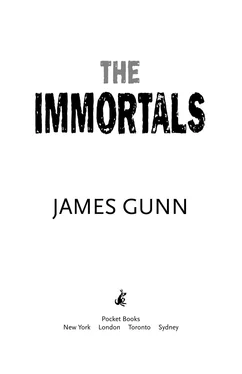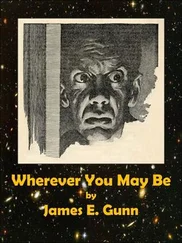Possibly only one man in the Institute knew its function. The thousands of other employees, many of whom were not listed on the payroll, performed their duties blindly, accepted their generous salaries, and asked no questions. If they wished to keep their jobs, that is.
The Institute survived on hope and thrived on death.
* * *
The main computer room was confusion that seemed to escape growing into chaos only by accident. Mail was opened, entered, stapled, and passed along assembly lines. Old newspapers were scanned by machines, key words identified by computers, and then checked, line by line, by human readers. Computer disks of all kinds were inserted into waiting receptacles and their information, like DNA, transformed into identical copies with new meaning. Copy boys raced along the aisles on roller skates. Clerks blue-penciled and clipped and commented to the computers. Operators punched electrons out of blank atoms…
Edwin Sibert threaded his way between the desks with a taut feeling of excitement, as if he were on his way to a rendezvous with the world’s most desirable woman. The copy room was old to him; he had spent six months there without learning anything. He didn’t glance at it as he climbed the steps behind the office set over the copy room like a guardroom over a prison yard.
The outer office was lined with locked filing cabinets; their contents were meaningless. A colorless, elderly filing clerk puttered among the papers in one of them.
“Hello, Sanders,” Sibert said carelessly.
The desk by the door leading into the inner office was equipped with a switchboard, a scrambler, an automatic recorder, and a lovely dark-haired secretary. Her eyes had widened as Sibert entered.
“Hello, Liz,” he said, his voice as effective as his appearance. “Locke in?” He moved past her to the door without waiting for an answer.
“You can’t, Ed—” she began, springing to her feet, “Mister Locke will—”
“—be very angry if he doesn’t get my news immediately,” Sibert finished. “I’ve found the key, Liz. Get it—Locke, key? A poor thing but mine own.” He drew skillful fingers along the smooth curve of her throat and jaw.
She caught his hand, held it to her cheek for a moment. “Oh, Ed!” she said brokenly. “I’m—”
“Be good, Liz,” he said cheerfully, his blue eyes smiling gently in his expressive face. “Maybe—a little later—who knows?”
But there would be no “later”—they both knew that. He had wasted a month on her before he was sure she knew nothing. He pulled his hand free and opened the door and stepped into the inner office.
Beyond Locke was an entire wall of one-way glass. From here the director of the Institute could watch the copy room or, if he wished, switch to indirect observation of the other rooms and offices of the windowless building. Locke was talking to someone on his private phone.
“Patience is our greatest asset,” he said. “After all, Ponce de León…”
Sibert turned his head quickly, but he caught only a glimpse of a face that great age had unsexed. It was wrinkled and gray and dead except for the eyes that still burned with life and desire.
“Interruption,” Locke said smoothly. “Call you back.” The screen set into the wall opposite him went dark as he touched the arm of his executive chair. “Sibert,” he said, “you’re fired.”
Locke was no youngster himself, Sibert thought. He was pushing ninety, surely, though he looked fit and vigorous. Medical care had kept his body healthy; geriatrics and hormone injections had kept his shoulders broad, his muscles firm and unwithered. Perhaps surgery had replaced his old heart and several other organs, but they could not rejuvenate his aging arteries and his dying cells.
“Right,” Sibert said briskly, another man than the one who had spoken to the secretary in the outer office. “Then you won’t be interested in my information—”
“Maybe I was hasty,” Locke said. His lips framed the unfamiliar words awkwardly. “If your information is important, I might reconsider.”
“And a bonus, too?” Sibert prompted.
“Maybe,” Locke growled, his eyes small. “Now, what’s so earth-shattering that it can’t come through channels?”
Sibert studied Locke’s face. It had not spent all its days in an office. There were scars around the eyes and a long one down one cheek almost to the point of the jaw; the nose had been broken at least once. Locke was an old bear. He must be careful, Sibert thought, not to tease him too much.
“I think I’ve found one of Marshall Cartwright’s children.”
Locke’s face writhed for a moment before he got it back under control. “Where? What name is he using? What’s he—”
“Slow down,” Sibert said calmly. He deposited his lean young body in the upholstered chair beside the desk and leisurely lit a cigarette. “I’ve been working in the dark for five years. Before I give anything away, I want to know what I’ve got.”
“You’re well paid,” Locke said coldly. “If this pans out, you’ll never have to worry about money. But don’t try to cut yourself into the game, Sibert. It’s too big for you.”
“That’s what I keep thinking about,” Sibert mused. “A few hundred thousand bucks—what’s that to an organization that spends at least one hundred million a year? Fifty years of that is five billion dollars. Just to find somebody’s kids.”
“We can get the information out of you.”
“Not in time. And time is what you don’t have. I left a letter. If I don’t get back soon, the letter gets delivered. And Cartwright’s kid is warned that he is being hunted…”
“Let me check that statement with truth serum.”
“No. Not because it isn’t true. You might ask other questions. And it would take too long. That’s why I couldn’t wait for an appointment. Try to squeeze the information out if you want to.” He lifted his right hand out of his jacket pocket; a tiny, ten-shot plastic automatic was in it. “But it might take too long. And you might lose everything just when everything is within your grasp. You might die. Or I might die.”
Locke sighed heavily and let his heavy shoulders relax. “What do you want to know?”
“What’s so important about Cartwright’s kids?”
“Barring accidents, they’ll live forever.”
* * *
The middle-aged man walked slowly through the station, his face preoccupied, his hands thrust deep in his jacket pockets. He retrieved an overnight bag from a locker and took it to the nearest washroom, where he rented a booth. He never came out of the washroom. A reservation on the Talgo express to Toronto was never picked up.
A young man with a floppy hat and a conquistador beard caught a taxi outside the station and left it in the middle of a traffic jam in the business section, walked quickly between the immovable cars until he reached the adjacent street, where he caught a second taxi going in the opposite direction. At the airport, he picked up a no-show reservation on the first outgoing flight.
At Detroit he caught a jet to St. Louis. There he changed to a slow, two-dozen-seat transport to Wichita. There he hired an old, two-seater jet, filed a flight plan, and proceeded to ignore it. Two hours later he set down at Kansas City’s nearly deserted International Airport and caught a decrepit bus down the old interstate and across the crumbling New Hannibal Bridge to the downtown shopping district.
The section was decaying. Business had followed the middle class into the suburbs. Buildings and shops had not been repaired for a decade. Only a few people were on the street, but the young man with the beard did the best he could, ducking through arcades, waiting in doorways, and finally edging into a department-store elevator just before the doors closed. The car creaked upward. When it reached the fifth floor, only the young man was left. The young man walked swiftly through the floor to the men’s room.
Читать дальше












